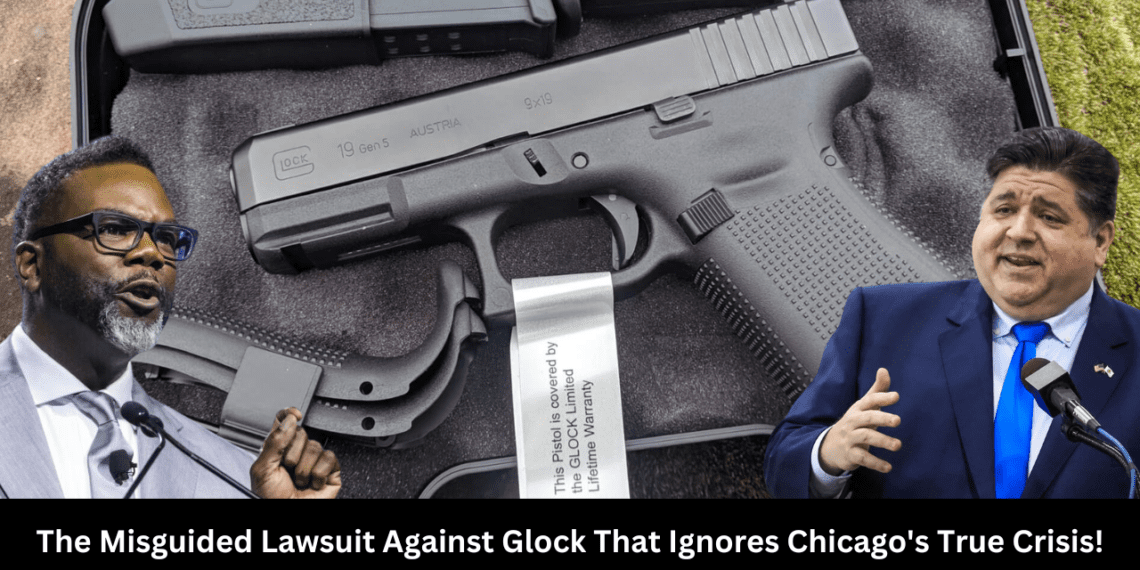In a move that has sparked considerable debate across the political and social spectrum, the City of Chicago has taken a bold step by filing a lawsuit against Glock Inc., one of the most recognized names in the firearm manufacturing industry. The lawsuit centers around a small device, often referred to as an auto sear or “Glock switch,” which can transform a semi-automatic pistol into a fully automatic weapon. This legal action, leveraging the Illinois Firearms Industry Responsibility Act (FIRA), signals a new front in Chicago’s long-standing battle against gun violence. However, this approach has been met with skepticism by those who see it as misdirected effort that unfairly targets manufacturers for the actions of criminals, while failing to address the underlying issues fueling the city’s high rates of crime and gang activity.
Critics argue that the lawsuit against Glock represents a profound misunderstanding of the complexities surrounding gun violence in urban environments like Chicago. For decades, the city has grappled with rampant crime, gang wars, and a seemingly intractable cycle of violence that affects many of its communities. Yet, the focus of the city’s latest legal action does not fall on these pressing issues but instead targets a manufacturer whose products are legally sold and widely used by law-abiding citizens and law enforcement alike.
The lawsuit asserts that Glock Inc. is somehow culpable for the criminal misuse of its products, specifically citing the ease with which some individuals have been able to modify Glock pistols into fully automatic weapons. However, this perspective overlooks the reality that the vast majority of gun owners use their firearms responsibly and in accordance with the law. Furthermore, it fails to acknowledge that the issue of illegal weapon modification is not unique to Glock but is a challenge faced by the entire firearms industry.
By focusing on Glock, critics suggest that Chicago’s authorities are engaging in a misguided attempt to find a scapegoat for the city’s endemic violence, rather than confronting the more difficult, underlying causes. These include entrenched social and economic inequalities, systemic poverty, underfunded education systems, and a lack of viable employment opportunities for young people. These factors, far more than the legal manufacture and sale of firearms, contribute to the cycle of violence plaguing Chicago.
Moreover, the lawsuit has sparked concerns about its implications for the Second Amendment and the rights of gun manufacturers and owners. The Protection of Lawful Commerce in Arms Act, which offers broad legal protections to the firearms industry, was enacted to prevent precisely this type of litigation, recognizing that holding manufacturers responsible for the criminal misuse of their products is both unfair and legally unfounded. Critics of the lawsuit see it as an attack on these protections and a dangerous precedent that could undermine the legal framework supporting gun rights in the United States.
The narrative that emerges from this legal action is one of misplaced priorities. Instead of launching lawsuits against gun manufacturers, critics argue that Chicago’s leaders should focus their efforts on addressing the city’s rampant gang activity, bolstering policing and community services, and investing in programs that offer young people alternatives to crime. Effective crime reduction strategies, such as community policing, improved mental health services, and targeted interventions for at-risk youth, have shown promise in other cities facing similar challenges but require commitment and resources.
The effectiveness of suing gun manufacturers as a strategy to combat gun violence is also called into question by the mixed results of similar efforts in the past. History has shown that legal battles against the firearms industry often fail to achieve their intended goals, instead diverting attention and resources away from practical solutions that directly address the sources of crime and violence.
While the City of Chicago’s lawsuit against Glock Inc. has brought attention to the serious issue of gun violence, it also highlights a broader debate about the most effective ways to address this challenge. Critics maintain that focusing on gun manufacturers misses the mark, drawing attention away from the urgent need to tackle the root causes of violence in Chicago and other urban areas. They argue for a more balanced approach that respects the rights of law-abiding gun owners and manufacturers while addressing the social, economic, and criminal justice reforms necessary to make a lasting impact on the safety and well-being of communities. As the legal process unfolds, it will be important to watch how these complex issues are navigated and whether the actions taken truly lead to meaningful changes in reducing gun violence.









